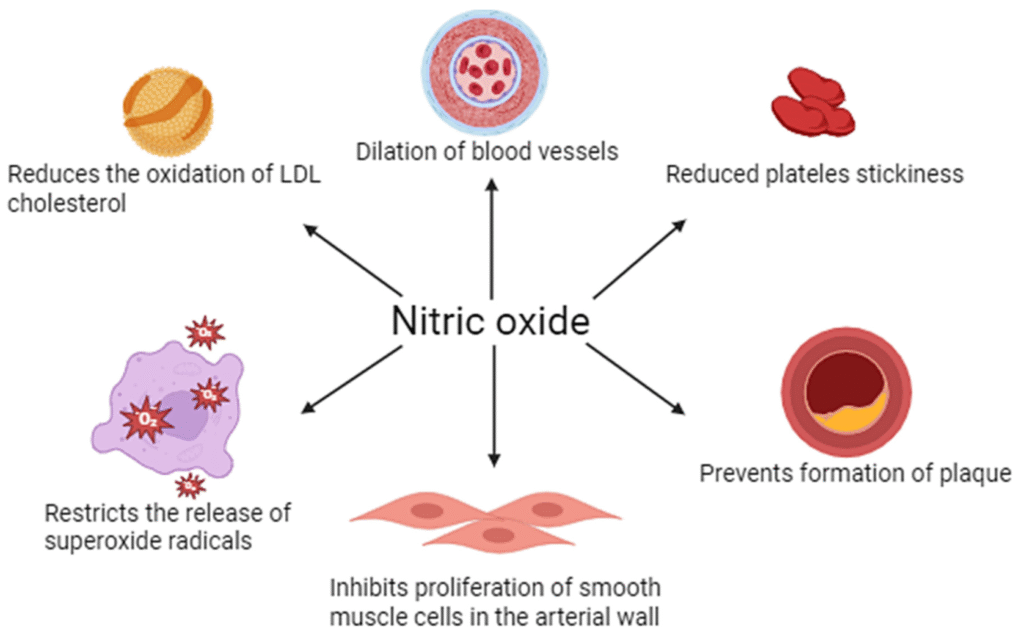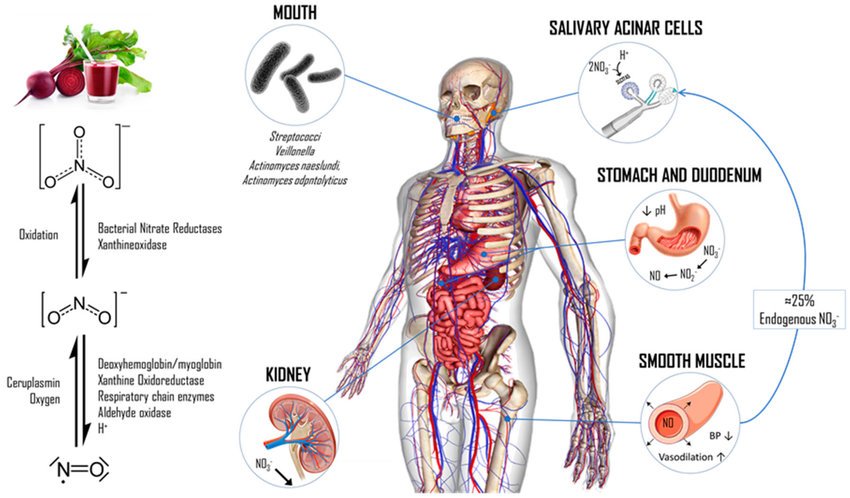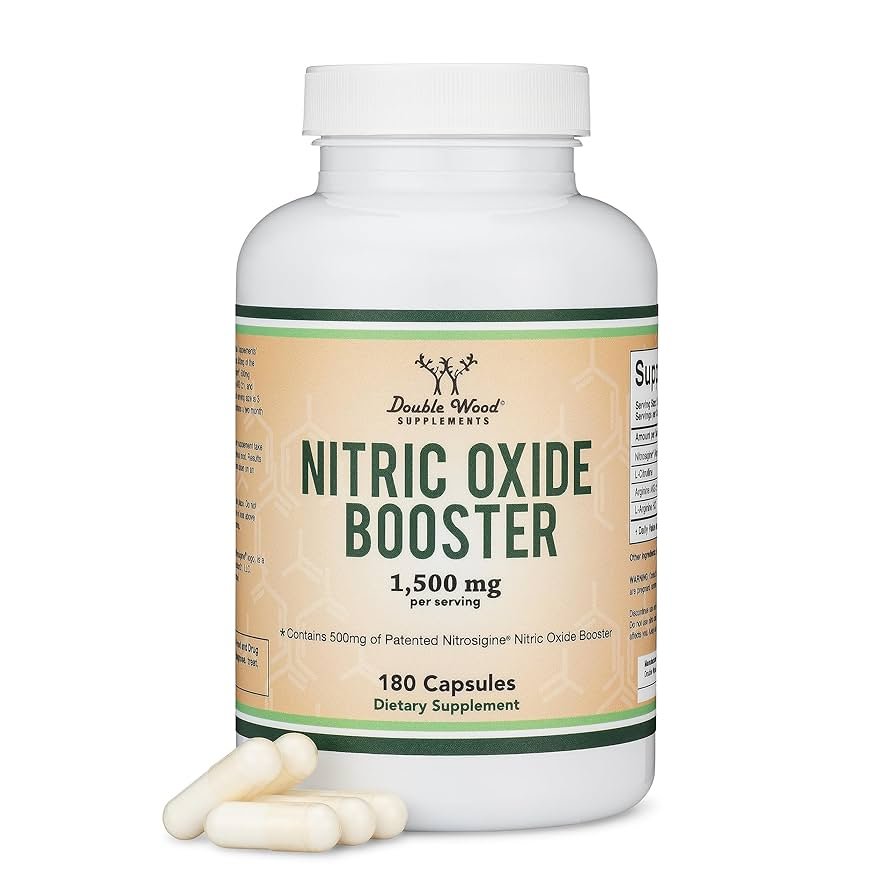Introduction
In recent years, Nitric Oxide has gained widespread recognition as a key molecule in promoting cardiovascular health, athletic performance, and even sexual function. Though it may sound like a synthetic chemical, nitric oxide is a naturally occurring gas in the human body that serves as a powerful signaling molecule. It plays a critical role in vasodilation (the widening of blood vessels), neurotransmission, immune response, and cellular communication.
Whether you’re an athlete looking to improve endurance or someone aiming to boost overall health, understanding the benefits and mechanisms of nitric oxide could be transformative.

What Is Nitric Oxide?
Nitric oxide (NO) is a colorless, odorless gas made up of one nitrogen atom and one oxygen atom. It is produced naturally in the body from the amino acid L-arginine, with the help of the enzyme nitric oxide synthase (NOS).
This simple molecule plays an incredibly complex role in human physiology. It was even named the “Molecule of the Year” by Science magazine in 1992, and the researchers who discovered its function won the Nobel Prize in Physiology or Medicine in 1998.

8 Ways Nitric Oxide Improves Your Health and Physical Performance
1. Enhances Blood Flow and Circulation
Nitric oxide helps relax and widen blood vessels (vasodilation), improving circulation throughout the body. This increases the delivery of oxygen and nutrients to your muscles, brain, and organs.
2. Lowers Blood Pressure Naturally
By expanding blood vessels, nitric oxide reduces resistance in the arteries, helping to lower high blood pressure and reduce strain on the heart.
3. Boosts Exercise Performance and Endurance
Increased nitric oxide improves oxygen efficiency in muscles, delaying fatigue and enhancing stamina during physical activities like running, cycling, and weight training.
4. Supports Heart Health
Nitric oxide prevents blood clots, reduces arterial stiffness, and lowers inflammation—key factors in reducing the risk of heart disease and stroke.
5. Improves Brain Function and Mental Clarity
Better blood flow to the brain enhances memory, focus, and overall cognitive performance. It may also play a role in protecting against age-related brain decline.
6. Enhances Immune System Response
Nitric oxide plays a role in immune defense by helping white blood cells destroy bacteria, viruses, and other harmful pathogens.
7. Supports Sexual Health and Performance
Nitric oxide promotes blood flow to reproductive organs, helping improve libido and erectile function—especially important for men’s sexual health.
8. Speeds Up Recovery After Exercise
Improved circulation helps reduce muscle soreness and speeds up the delivery of nutrients to muscle tissue, aiding in faster recovery and growth.
How Does Nitric Oxide Work in the Body?
Nitric oxide functions as a vasodilator, meaning it relaxes the inner muscles of the blood vessels, causing them to widen. This results in:
- Improved blood flow
- Reduced blood pressure
- Enhanced oxygen delivery to tissues and organs
The molecule also acts as a neurotransmitter in the brain, facilitates immune responses, and plays a role in mitochondrial function—vital for energy production.
Health Benefits of Nitric Oxide
1. Cardiovascular Health
One of the most critical roles of nitric oxide is maintaining vascular health. By helping blood vessels relax, NO reduces the risk of hypertension, atherosclerosis, and stroke. Low nitric oxide levels have been linked to heart disease, which is the leading cause of death globally.

2. Enhanced Athletic Performance
Nitric oxide supplements, often in the form of L-arginine, L-citrulline, or beetroot juice, are popular among athletes. By increasing blood flow and oxygen delivery to muscles, nitric oxide improves:
- Endurance
- Recovery
- Overall exercise efficiency
Studies have shown that athletes using nitric oxide boosters can train longer with less fatigue.
3. Improved Cognitive Function
Nitric oxide supports neuroplasticity, the brain’s ability to form new connections and adapt. Enhanced blood flow to the brain can improve memory, focus, and reduce the risk of neurodegenerative diseases like Alzheimer’s.
4. Immune System Support
In the immune system, nitric oxide helps white blood cells destroy pathogens. It is a part of the body’s natural defense mechanism against bacteria, viruses, and even tumor cells.
5. Sexual Health and Erectile Function
One of the earliest uses of nitric oxide in medicine was in erectile dysfunction treatments. The drug Viagra works by enhancing the nitric oxide signaling pathway. Increased blood flow due to nitric oxide contributes to better erections and improved sexual function.
Natural Ways to Boost Nitric Oxide Levels
1. Eat Nitrate-Rich Foods
Vegetables like beets, spinach, arugula, and celery are high in nitrates, which your body converts into nitric oxide.
2. Consume L-arginine and L-citrulline
These amino acids are precursors to nitric oxide. Foods like nuts, seeds, fish, and watermelon are excellent sources.
3. Exercise Regularly
Physical activity naturally stimulates nitric oxide production, especially aerobic exercises like jogging, swimming, or cycling.
4. Reduce Mouthwash Use
Surprisingly, overusing antiseptic mouthwash can kill bacteria in the mouth that help convert nitrates into nitric oxide.
5. Get Enough Sleep
Chronic sleep deprivation can impair nitric oxide production, contributing to increased risk of hypertension and poor vascular function.

Nitric Oxide Supplements: Are They Effective?
Nitric oxide supplements typically contain L-arginine, L-citrulline, or beetroot extract. These are marketed to:
- Enhance workout performance
- Improve muscle pumps
- Boost cardiovascular function
While research supports some of these claims, the effectiveness may vary from person to person. It’s important to choose supplements that are clinically tested and free of harmful additives.

Potential Risks and Side Effects
While nitric oxide is generally safe, there are a few precautions:
- Over-supplementation can cause low blood pressure
- May interact with blood pressure or erectile dysfunction medications
- High doses of L-arginine may cause gastrointestinal distress
Always consult a healthcare provider before starting a nitric oxide supplement, especially if you have pre-existing health conditions.
Final Thoughts
Nitric oxide is much more than just a scientific curiosity—it’s a fundamental molecule that supports nearly every system in the body. From improving heart health to enhancing athletic performance and even supporting brain and immune function, nitric oxide plays a critical role in maintaining optimal wellness.
By incorporating nitric oxide-boosting foods, exercising regularly, and considering supplements where appropriate, you can unlock a wide range of health benefits. Given its importance, nitric oxide truly deserves the title of the “miracle molecule.”

Frequently Asked Questions (FAQs)
Q1: Is nitric oxide the same as nitrous oxide?
No, nitric oxide (NO) is a natural gas involved in physiological functions, while nitrous oxide (N₂O), also known as laughing gas, is used as an anesthetic.
Q2: How long does it take for nitric oxide supplements to work?
Effects like improved blood flow or endurance may be noticed within 30–60 minutes, though long-term benefits develop over time with regular use.
Q3: Can nitric oxide help with aging?
Yes. Since nitric oxide levels decline with age, boosting them may help reduce blood pressure, improve cognition, and support overall vitality.


